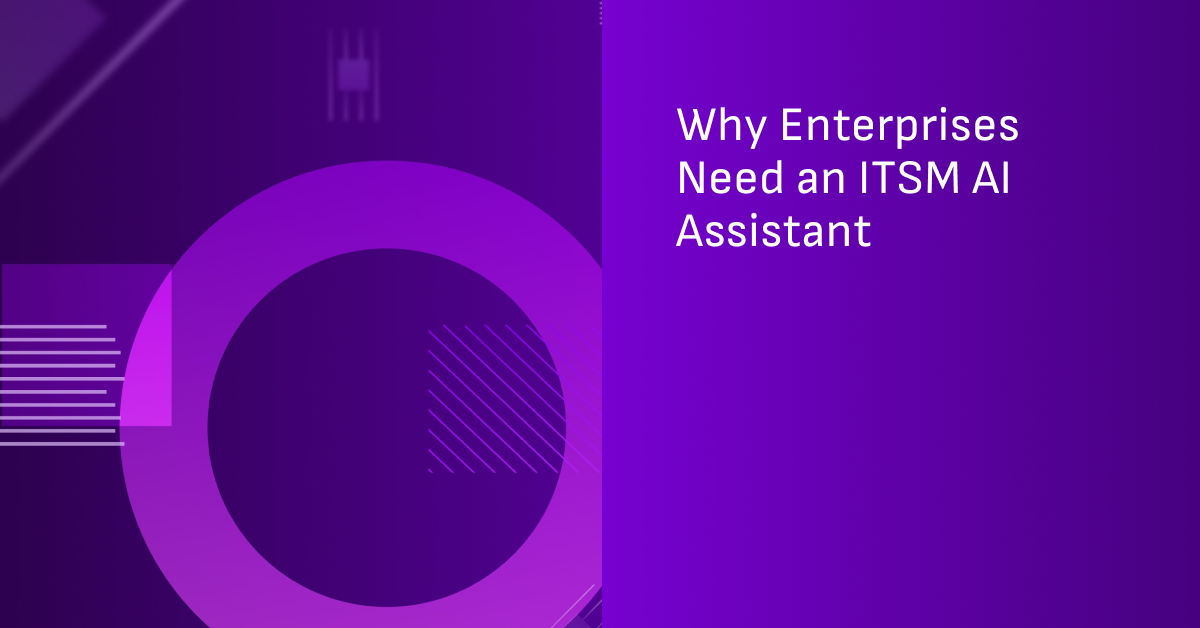It’s 9:45 AM, and your IT team is already buried in tickets. Password resets, software installs, access requests... they’re stacking up faster than you can keep up.
Meanwhile, employees are getting frustrated waiting for help, with their productivity slowing down over issues that should take minutes to fix, not hours (or worse, days).
Sadly, benchmark data across various industries shows that IT support teams are handling high ticket volumes, with some teams dealing with hundreds — or even over 1,000 — tickets every month. That's an overwhelming workload that leaves your team stressed, burned out, and unable to focus on the strategic initiatives that could truly transform your business.
But what if there was a solution that could automate the repetitive tasks overwhelming your support team while also providing employees with immediate, 24/7 assistance?
That's where AI assistants for ITSM come in. While traditional AI chatbots have been around for years, the new generation of AI assistants represents a quantum leap forward in capability and effectiveness.
These intelligent systems don't just follow rigid scripts like their predecessors — they are able to understand context, learn from interactions, and can take autonomous actions across your enterprise systems.
Let's explore why implementing an ITSM AI assistant is a new necessity for enterprises looking to transform service management.
What is an ITSM AI assistant?
First things first: What is an ITSM AI assistant, anyway?
It’s an advanced software tool that uses artificial intelligence to automate and enhance existing IT service management tasks, and provide intelligent support throughout the entire service lifecycle.
Unlike traditional help desk software, an AI assistant does more than just simply track tickets. ITSM AI assistants also typically handle simple, routine tasks such as password resets and ticket routing, which can alleviate some of the IT team's workload but may still require human intervention for more complex issues.
However, advanced ITSM AI assistants can actively work to resolve incidents too. Through a combination of natural language processing (NLP), machine learning (ML), and integration with your existing systems, they can understand end user requests, provide immediate assistance, and execute multi-step workflows without human intervention.
Advanced ITSM AI assistants can understand natural language, provide real-time, context-aware assistance, and improve responses over time to help reduce response times and improve overall service efficiency.
They serve as the first point of contact for employees seeking IT support — rather than your already overloaded help desk team — and handling tasks ranging from basic troubleshooting to complex service requests.
Chatbot vs. AI assistant
Before going any deeper, let's distinguish traditional chatbots from true AI assistants in business.
Traditional chatbots typically operate on predefined rules and decision trees. They can respond to specific keywords or phrases but struggle with topics outside their programmed parameters and logic.
These systems typically provide basic information retrieval or follow simple workflows but require extensive manual maintenance to remain relevant.
Limitations of their design become apparent when dealing with complex or more nuanced requests, such as:
- They can't understand context or intent beyond exact keyword matching
- They fail when users phrase questions in unexpected ways
- They require constant updates to handle new scenarios
- They can't learn from past interactions to improve future responses
- They rarely integrate deeply with enterprise systems to take meaningful actions
So what’s the difference?
A chatbot primarily focuses on simulating conversation with users through text or voice, handling inquiries, and providing customer support but typically lacks the broader task execution capabilities of an AI assistant.
An AI assistant is designed to perform tasks such as setting reminders, sending messages, or providing information, often integrating with other applications and services.
Advanced AI assistants powered by advanced machine learning and agentic AI are an even bigger step forward. Instead of sticking to strict rules, they can understand natural language, pick up on intent, and continue to get better over time.
An agentic AI assistant can take independent actions and use reasoning to determine the right action to take and handle edge cases without human intervention.
1. Automation reduces busywork and alleviates IT team workloads
One of the most immediate benefits of implementing an ITSM AI assistant is the dramatic potential reduction in mundane, repetitive tasks that take up your IT team's time and energy.
Think about how much of your support team's day is spent on routine L1 activities like password resets, access permissions, and basic troubleshooting. These tasks (while necessary) don't require specialized expertise, but they do create a constant stream of interruptions that prevent your team from focusing on higher-value work.
An advanced AI assistant can automate these processes end-to-end, handling initial request to resolution without human intervention. This automation delivers several critical benefits:
- Automatically sorting and routing tickets makes sure issues get to the right teams right away
- Password resets and account unlocks that can happen in seconds, not hours
- Software access requests are verified and fulfilled based on role-based policies
- System monitoring alerts are triaged and prioritized before reaching human eyes
- Common Level 1 support tasks are resolved without staff intervention
- Duplicate tickets are identified and consolidated automatically
By taking these responsibilities off your team's plate, an AI assistant allows them to focus on complex problems, strategic initiatives, and meaningful improvements to your IT infrastructure.
2. Self-service support improves employee satisfaction
Your employees have grown accustomed to instant solutions in their personal lives. When they run into problems at work, the gap between smooth, consumer-grade experiences and traditional IT support can feel pretty frustrating.
Self-service support powered by an AI assistant bridges this gap, letting employees solve their own problems quickly and efficiently. This approach delivers the benefit of speed while giving employees agency and control over their work experience.
An AI assistant makes this possible by providing an intuitive interface for answering questions and resolving common problems without waiting for human assistance.
Getting answers
With ITSM assistants, employees now have one central place to ask questions and get answers for questions across diverse domains.
Whether it’s getting provisioned with tools you need to do your job:
Or troubleshooting printer support:
These are just a few examples of questions that can be quickly answered through an AI assistant.
When employees have easy access to this info, they can find what they need faster and more efficiently. This saves time for both the employee and HR while encouraging a culture of self-sufficiency and ongoing learning within the company.
Taking action
Getting answers is only part of the equation, though. Taking action is where the magic happens.
Take an audio issue for example. While this would typically require a lengthy support process, an ITSM assistant can resolve issues directly or create a ticket instantly.
Whether it’s automating software provisioning:
Or instantly creating a support ticket:
This self-service approach helps get rid of the wait time for support. When employees can fix their own issues in near real-time, they can stay on track and focused on their higher-value tasks.
3. Conversational AI improves the user experience
The quality of your support experience plays a big role in how employees see your IT team. Traditional ticketing systems and generic email replies can feel frustrating and disconnected. Conversational AI changes that.
An AI assistant provides a natural, human-like interaction that feels more like talking to a knowledgeable colleague than submitting a request into the void. This conversational approach makes it faster to get help, while still being engaging.
The key to this improved experience lies in the advanced technology powering these interactions. Using an advanced AI assistant with a reasoning engine for end-to-end employee support allows for:
- Understanding user needs: When employees ask for help, the AI instantly understands their needs, using advanced language models to interpret their goals with precision, even when requests are ambiguous or complex.
- Planning for success: The reasoning engine matches problems to the right plugins, plans workflows, and evaluates those plans against your enterprise setup and policies for the best outcome.
- Executing with purpose: Actions are sequenced, plugins are called, and results dynamically adjust to ensure the reasoning engine delivers outputs and outcomes that meet employees' goals.
This conversational interface is especially useful in today’s hybrid and remote work environment, where getting in-person (and immediate) IT support isn’t always easy — or possible.
An AI assistant offers reliable, high-quality support no matter where you are or what time it is, making sure everyone gets the same great support experience.
4. Predictive analytics empower proactive problem-solving
Reactive support (waiting for issues to occur before addressing them) has long been the standard approach for IT teams. An AI assistant changes this experience by identifying and addressing potential problems before they impact your employees.
AI-powered ITSM solutions continuously analyze patterns in your support data, system performance metrics, and user behavior to predict where and when issues might arise. This predictive capability enables truly proactive management:
- You can catch and fix system performance issues before users even notice things slowing down
- Software license expirations are tracked and renewals are initiated automatically
- Security vulnerabilities can be identified and patched proactively
- Usage patterns help identify opportunities for optimization and improvement
- Common failure points in workflows are highlighted for process improvement
With advanced natural language understanding, dashboard tools like Employee Experience Insights (EXI) help to review your support tickets in real time, giving you a clear picture of what to tackle next.
Shifting from reactive to proactive support isn’t just about cutting down tickets, though. When you take care of issues before they affect users, you create a more reliable IT setup that helps your business run smoothly.
5. AI-powered solutions strengthen enterprise scalability
Hiring more staff to keep up with user growth gets pricey and isn’t the most efficient solution. That’s where an AI assistant comes in — it can be a smarter, more scalable way to handle your growing support needs.
AI-powered solutions help manage rising ticket volumes, enabling lower response times and higher service quality.
Multi-lingual support capabilities
An advanced AI assistant with multi-language support allows global enterprises to provide native-language support, eliminating the need for multilingual staff.
This improves comprehension, resolution rates, and creates an inclusive support environment, ensuring employees can get the help they need in their preferred language.
Personalized support
One-size-fits-all support creates frustration when generic information isn't relevant to an employee's specific situation. AI assistants can provide personalized experiences tailored to each user's role, location, department, access levels, and past interactions.
This means employees get support that’s relevant and specific to their needs. For instance, if a sales rep and a software developer both ask, “How do I access my work applications remotely?”, the AI assistant would tailor its response based on their roles.
- The sales rep might receive instructions on logging into the company’s CRM and email via a VPN or web portal, with links to mobile-friendly options.
- The software developer might get guidance on connecting to the company’s cloud development environment, accessing code repositories, and setting up secure SSH keys or API credentials.
By providing role-specific answers, the AI assistant ensures employees get the most relevant and useful support without unnecessary confusion.
Reduced IT support costs
Implementing an AI assistant improves efficiency while also reducing support costs by automating routine tasks and enabling self-service. Savings come from dramatically reduced workloads, lower escalation rates, faster resolutions, improved first-contact outcomes, reduced training expenses, and a reduced need to engage with Managed Service Providers.
As your organization grows, AI ensures scalable, cost-effective support without proportional budget increases.
Learn the top 4 AI shifts for IT teams in 2025. Download the report to stay ahead.
Multi-app and multi-channel integration
An AI assistant integrates with multiple applications and communication channels, creating a unified support experience.
It simplifies support by serving as a single point of contact for requests across systems, letting employees use their preferred platforms like Slack, Teams, or email.
Strengthened security
AI assistants can even enhance enterprise security by automating sensitive tasks like access management and monitoring for unusual activity, reducing risks from manual processes.
Continuous learning and improvement
Unlike static systems that require manual updates, AI assistants are able to continuously improve over time. This ongoing improvement means the system becomes more effective over time, recognizing new patterns and adapting to changing support needs without requiring constant updating.
This learning capability is especially useful when new applications are deployed or policies change. The AI can quickly adapt to these changes, reducing the support burden during transitions and ensuring employees always have access to current information.
Agentic AI enables productivity at scale
AI assistants streamline ITSM by automating tasks like ticket categorization and troubleshooting, reducing response times – and an agentic AI assistant can be even more effective across numerous use cases.
‘Agentic AI’ refers to AI systems designed to autonomously complete complex goals and manage workflows with minimal direct human oversight. They can:
- Perceive and identify the problem
- Figure out the right solution
- Take independent action
- Learn from interaction
These capabilities enable agentic AI assistants to function independently, proactively, and intelligently, helping to address complex challenges in ever-changing environments.
Supercharge your IT service desk with an agentic AI Assistant
The challenges facing service IT support teams aren't going away — and, in fact, they're increasing as technology becomes more central to every business function. Traditional approaches just can't keep pace with growing demand, rising complexity, and employee expectations for immediate, high-quality support.
While some AI assistants need a lot of customization or rely on basic, rule-based responses, Moveworks can provide quick value with its out-of-the-box platform.
Moveworks AI Assistant for employee support, combined with an agent builder for creating custom AI agents, gives you incredible flexibility and power.
Moveworks stands out in the crowded world of AI solutions with its agentic AI architecture, designed specifically for the enterprise so you can tackle support needs right away while building tailored solutions to meet your unique challenges.
Request a personalized demo today and see how Moveworks can revolutionize your support operations and IT service management with agentic AI.
Table of contents



